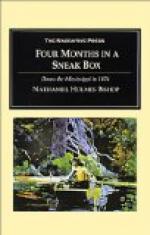About dusk I rowed into a grove of young willows, on the left bank of the river, on the Shepard Plantation. My boat was soon securely fastened to a tree, and having partaken of my frugal meal I retired. A comfortable night’s rest was, however, out of the question, for the passing steamers tossed me about in a most unceremonious manner, seeming to me in my dreams to be chanting for their lullaby, “Rock-a-by baby on the tree-top.” Indeed, the baby on the tree-top was in an enviable position compared with my kaleidoscopic movements among the swashy seas. Many visions were before me that night, of the numerous little sufferers who are daily slung backwards and forwards in those pernicious instruments of torture called cradles.
Memory brought also another picture I hoped it had been my good fortune to forget. It was a scene on the veranda of a country house. Five sisters, all pretty girls, whose grace arid vivacity I had often admired, were there, each in her rocking-chair, and each swinging to and fro, as though perpetual motion had been discovered. Why must an American woman have a rocking-chair? In no other country in the world, excepting among the creoles of South America, is this awkward piece of furniture so popular. Burn the cradles and taboo the graceless rocking-chair, and our children will have steadier heads and our women learn the attractive grace of quiet ease.
The following day I struggled against head winds and swashy seas, until their combined forces proved too much for me, and succumbing as amiably as possible under the circumstances, the little white boat was run ashore on the Picou Plantation, where the coast was fortunately low. The rain and wind held me prisoner there until midnight, when, with a rising moon to cheer me, I forced a passage through the blockade of driftwood, and being once more on the river, waved an adieu to my last camp on the Mississippi.
I was now only thirty-seven miles from New Orleans. Rowing rapidly down the broad river, now shrouded in gloom, with the fleecy scuds flying overhead in the stormy firmament, I fully realized that I was soon to leave the noble stream which had borne me so long and so safely upon its bosom. A thunder-shower rose in the west—its massive blackness lighted by the vivid flashes which played over its surface. The houses of the planters along the river’s bank were enveloped in foliage, and the air was so redolent with the fragrance of flowers that I seemed to be floating through an Eden. The wind and the clouds disappeared together, and a glorious sunrise gave promise of a perfect day. With the light came life. Where all had been silent and restful, man and beast now made known their presence. The rising sun seemed to be the signal for taking hold where they had let go the night before. The crowing of cocks, the cries of plantation hands, the hungry neigh of horses, the hundred and one sounds of this work-a-day world, greeted my ears, while my eyes, taking a rapid survey of the surrounding steamers, coal-arks, and barges of every description, carried quickly to my brain the intelligence that I was near the Crescent City of the Gulf. Soon forests of masts rose upon the horizon, for there were vessels of all nations ranged along the levee of this once prosperous city.




